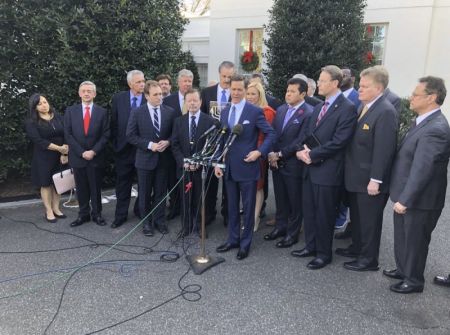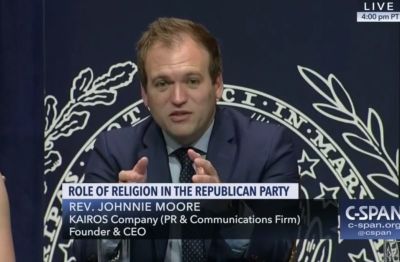Johnnie Moore Says Evangelical Leaders Criticize Trump Behind Closed Doors

One of President Donald Trump's informal evangelical advisers has assured that the group of evangelical leaders who advise the administration do in fact criticize the president behind closed doors but don't necessarily do so in public.
Johnnie Moore, an evangelical public relations executive who was instrumental in piecing together an evangelical advisory committee that served Trump during the 2016 primary election, participated in a Georgetown University panel discussion this week in Washington, D.C. focusing on the "Role of Religion in the Republican Party."
Being the only member of the panel that is actively involved in advising the Trump administration, Moore, a former senior vice president of communications at Liberty University, was asked why so many white evangelicals voted for Trump.
The question came as exit polls show that about eight out of 10 self-identified white evangelicals who voted in the 2016 primary election cast their vote for the thrice married real estate mogul and reality television star who once claimed that he had no reason to repent.
After explaining that the election came as there was a Supreme Court vacancy and clear "existential threats" to religious liberty stemming from the left's advancement of abortion and LGBT rights, Moore contended that evangelicals were left with the choice of Trump or the Planned Parenthood-endorsed Democrat, Hillary Clinton.
Moore argued that evangelicals had always felt like "outsiders" in the Republican Party but the difference with the 2016 election was the fact that Trump, an "outsider" candidate, was reaching out to leaders of an "outsider" community.

"When Donald Trump calls us and asks if we would put together a group of evangelical advisers to provide advice to the campaign, my first statement was, 'Well, are they required to endorse you?' He said, 'No, they are not required to endorse me,'" Moore said. "I said, 'What about a Monday call every single Monday, and not a Dial-*7-to-ask-your-question [type of conference call] where it is moderated by somebody. We have an open call and we have an open conversation.'"
Moore, who is also a Christian Post senior editorial adviser, told the crowd that calls between the then-Republican nominee and the evangelical leaders did happen "every single Monday."
"When I have been with Donald Trump and this group of evangelicals that he has become close to, there is a genuine conversation, a genuine relationship," Moore stated.
Since Trump assumed the presidency, Moore and dozens of other conservative evangelical leaders have regularly been invited to the White House for listening sessions with that have included White House staffers and sometimes Trump and Vice President Mike Pence.
It is the evangelical leaders' close relationship with Trump and his administration that has led many on both the political left and right to question the relationship.
In light of some of Trump's brash statements on immigrants and women and his past immoral actions (such as allegations of an affair with porn star Stormy Daniels and his bragging about grabbing women by their crotch), many have accused evangelicals with access to the president of turning a blind eye to those digressions in order to achieve their desired political goals.
Although the evangelical leaders have established a "genuine relationship" with the president, Moore suggested that the leaders have not been afraid to voice their disagreements or concerns.
"By the way, it is not that this community doesn't criticize him," Moore said. "The Bible tells me that 'Faithful are the words of a friend.' That doesn't say that it has to be in bold 32-point font on the front page of the New York Times."
"I think that this is a community that has ... in a particular environment in a particular time in series of circumstances, created an unlikely alliance," he continued. "There was a lot of pessimism about how that alliance would play itself out. But what has happened is we found that again and again and again, there is this strange politician that generally has kept his promises to our community, which is an unusual characteristic for a politician."





















